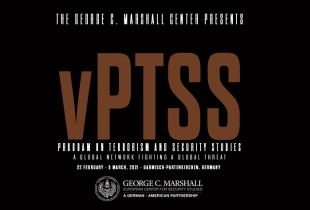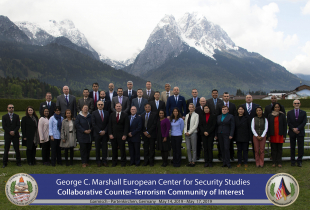
Counterinsurgency Curriculum Development Launched by Partnership for Peace Consortium
By Partnership for Peace Consortium
TALLINN, Estonia (Feb. 13, 2015) – In the wake of the terrorist attacks in Paris, the development of a new Counterinsurgency Curriculum is underway through a joint effort between The Partnership for Peace Consortium’s Conflict Studies Working Group and the Baltic Defense College.
Upon completion, the curriculum will be available to NATO and coalition partners.
A kickoff event in Tallinn from Jan. 12 to 15 saw experts from the Baltic Defense College, the French Ministry of Defense, the Hungarian MoD, the Department of Military History at the U.S. Army Command and General Staff College, the U.S. Army Center of Military History, and the Near East South Asia Center for Strategic Studies.
The group examined the nature of COIN – past and present - and identified the essential content that will constitute a COIN Curriculum.
The Dean of the Baltic Defense College Dr. Augustine Meaher IV spoke of his institute’s cooperation with the PfPC, noting that “as the world confronts violent extremism groups such as ISIS and Al Qaeda, whose tactics and organization are largely counterinsurgent, the development of a COIN Curriculum takes on special significance. It is through such education that future leaders will be prepared to make decisions that contribute to our collective security.”
COIN Curriculum development is the latest in a series of PfPC defence education curricula development activities. To date the PfPC has developed reference curricula in areas such as Officer and Non-Commissioned Officer Development.
A number of partner nations are incorporating the PfPC-developed curricula into their defense education institutions. For instance, the PfPC and NATO through their jointly managed Defense Education Enhancement Program are collaborating with countries such as Ukraine, Georgia, and Kazakhstan, who are at various stages of NCO curriculum adoption.
With a blueprint in hand, the PfPC’s Conflict Studies group will convene a series of curriculum authoring sessions which are expected to culminate in the completion of the COIN Curriculum by the end of 2016. Upon completion, the curriculum will be available to defense education institutions interested in the adoption of COIN studies into their educational programs.
The PfPC Operations Staff is co-located with the George C. Marshall European Center for Security Studies in Garmisch-Partenkirchen, Germany.
The mission of the Marshall Center, as a vital instrument of German-American cooperation, is to create a more stable security environment by advancing democratic institutions and relationships; promoting active, peaceful, whole-of-government approaches to address transnational and regional security challenges; and creating and enhancing enduring partnerships worldwide.


